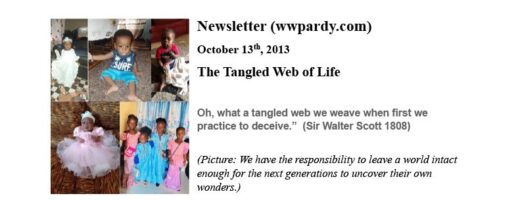Recently one of my friends quoted a well known American economic guru saying that we are in the midst of one of the world’s fifty years cycles of economic change. This reminded me of an essay which I read over tens years ago written by two economists; a Brit and an American. They were espousing a similar historic theory and debating its cause. One was suggesting that it was the result of economic change over time, while the other argued it was a result of natural generational change; in other words demographics.
Not being a historian, economist or guru, one can never be sure what is fact and what is pure speculation, or even when stories are based on history. But being observant and inquisitive it is easy to see that a transformation has happened. At my age one can even postulate that this transformation began a long time ago. But in reading the current press, the commentaries and analysis by economists and gurus alike, one might question whether there is history at all.
The financial crisis impacting most of the developed world and subsequently the developing world, is supposed to have its roots in flawed mortgages (sub-prime) and how they were shared among investors. Yet one has only to be older and not necessarily wiser to suggest that perhaps it’s more the result the decline in values, the gradual collapse of democratic processes and the emergence, especially in the west, of government systems more into control than democratic governance. Someone wiser would point out that mostly this transition emanates from the very human element of greed. As both economic and social structures and their systems are the creations of humans this cannot be discounted.
When one gets older, reflection becomes a little easier, because having lived through most of this last economic cycle, and being inquisitive, a sort of data base of information has accumulated. That is, at least enough information to ask questions and reflect. After the great depression and Second World War there were two dominant philosophies at work in the world; communism and (democratic) capitalism. This is not to discount the myriad of less prominent philosophies at work as well. Both promised progress and prosperity. Some believers suggested that their particular choice would provide a modern day ‘nirvana”.
The euphoria of “victory’ after the war led to different thrusts for those under the control of both systems. The west saw an unprecedented push for freedom and the liberalization of everything. The east, as we now know, sought suppression and control. Both involved the diminishment of cultural and historic values. This period, I would suggest, began the current cycle of economic and social transformation that we are living today. Sadly during this past cycle of change, the shift in the west to freedom and liberalization has led to control, restraint and resultant passivity, while in the east, the push for suppression and control has resulted in the unleashing of unfettered liberalization without real freedom at all.
This transformation is not just beginning or happening; it is reaching its apex. It is upon us, despite protestations often heard, that it won’t be in our time. What is being experienced in the world today is not just another economic slowdown or market correction but a shift so profound in the makeup of the world that it will emerge totally different. It could be argued that one of the dominant philosophies at play after the war, climaxed twenty years ago when the Soviet system collapsed, while the other has been able to stave of its demise until now. The systems emerging appear to be mixture of both philosophies and haven’t fully evolved. The emergence of the predominant philosophies that will take us into the next transformational stage of human development have yet to fully appear. Some of the more visible ones are scary at best and one hopes that a reflection on the more positive values evident as change started sixty years ago will be once again renewed and reinforced.
One could suggest that change brings chaos, while transformations provide shift. The economic and social balance of the world has shifted whether we wish to believe it or not. The social and economic structures within the world have seen gradual shifts, much like those caused by minor earthquakes, every decade since the 1940’s. With earthquakes, the minor ones are the precursors to the larger one that will transform the landscape. The fault line for this current transformational quake is very evident. Trying to fill this hole, as many governments are attempting, is an exercise in futility.
There are many examples of these small seismic shifts over the past 60 years. The various recessions, the industrial and manufacturing decline in the most developed countries and the diminishment of institutions and social support mechanisms. Economically the shift of wealth from the many to the few and from the developed countries to the developing is profound. Did not anyone anticipate that such movement of industry and knowledge (the main creators of wealth in the industrial societies) to capitalize on fiscal advantages of cheap resources and labour would bring imbalance. In nature it is the imbalance that creates the fissures that produce the earthquakes that cause the shifts.
These shifts were further exacerbated by the neutering of the social structures created to provide balance and future security in the early stages of this transformation. Perhaps no one really understood that the basis of these social institutions and programs were tied to the ability to generate wealth. The shifts were further enabled by the belief that money was wealth and currency had value, in and by itself, and would sustain its own proliferation. Conceivably, no one recognized that currency without a basis in something of real wealth is only paper without worth.
The compassionate and passionate leaders that initiated the policies and programs that facilitated the building of industrial and economic power houses and sophisticated social support systems have been replaced by ego centered people. Their greatest passion seems to be self-aggrandization rather than societal well being. This is not to suggest that some of the former passionate leaders were correct in all of their beliefs and initiatives; but most did have some belief in an ideal. The majority of leaders today appear to have only belief in themselves, power and its retention and “their” place in history.
So the world and its people find itself atop a precipice of transformation, a fundamental shift in power structures and an uncertain future economically, socially, ecological and most importantly spiritually. As in our own lives there is no road back only forward. Like most similar periods in history people search for the saviour who will right the wrongs and bring balance. But, I fear, that this time, even if one is found or invented, the expectations are so great and any one person’s ability so limited that even greater calamity will ensue.
Precipices are where one sees opportunity, if one is not too afraid to look, to contemplate and to share. For, in most historic times of uncertainty and despair, what appears amongst the majority is the most human passion of all – caring and sharing. Some perhaps might argue that the opposite comes to the fore; that human element of greed. Fortunately, this usually appears in the few, as is most evident today. In fact, one can see the movement of many of those with wealth into charitable giving. They perhaps have come to realize that there is no spiritual gain or real comfort in money or material wealth, only in such sharing and the personal reward that it brings.
At the beginning of this past transition this is what appears to have happened. The defeated were aided by the victors, and as such, new economies emerged, new social structures were created and a period of innovation captured the attention of the world. Despite the continual threat of war, progress ensued within both predominant philosophical ideological spheres. Most importantly ideals and idealists became part of life and living; even in the more repressive environments. Beliefs were shared; and even in disagreement the world came closer together.
The opportunities in this current transformation lie in the new and emerging powers. In these places people have a renewed sense of hope and a desire for better lives and futures for their children. In the midst of all the chaos, within which they have become engulfed, lies a set of values beneficial to all. Those in the west must awaken from their slumber; pry themselves from their addictions and fears to once again recognize that many of these values made life important to us at one time as well. By re-embracing many of the values, which were the foundation for the last cycle of change, we may yet salvage what’s left of our societies. We also may encourage those emerging powers of the importance of retaining theirs, despite the pressures they feel to abandon them for the sake of material wealth.
The challenge for all, especially those of us who live in privilege, will be to transform ourselves, and accept our responsibilities for healing the human world and caring for our physical planet. The world, perhaps as never before is in need of spiritual rejuvenation and a foundation for living based on the human values of caring and sharing. If the next cycle of economic change were built on this foundational philosophy with economic and social constructs to support it, then it would be a transformation of spiritual proportions.
Perhaps, notwithstanding the advanced state of this current transformation, some balance can be achieved and stability created for the short term. Possibly the next wave of change can be built on the most positive aspects of the two prevalent philosophies that fueled the last. If there is enough will remaining, enough desire evident and enough hope available to overcome the cynicism and despair currently engulfing developed societies, then a truly “humane” society can emerge to lead us through our next cycle of change. This “human” philosophy will bring sanity to a world lost in itself and embolden the next generation to embrace a more spiritual approach to life and living where caring is important and sharing essential. This is the real transformation that humans have been seeking since the dawn of human life.
Written by Bill Pardy
Revised August 7th, 2008


